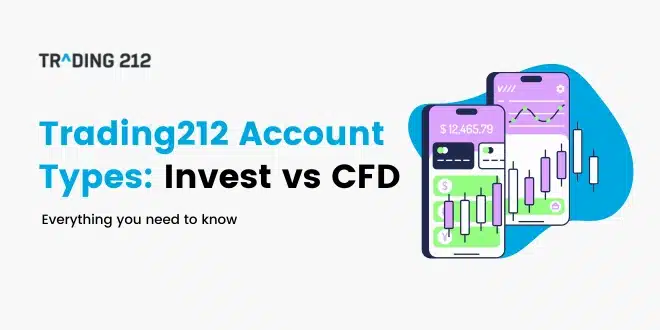If you’re thinking about opening an account with Trading212, one of the first decisions you’ll face is choosing between Invest and CFD accounts.
At first glance, these account types might seem similar — both let you trade stocks, currencies, and other assets. But they work very differently, and choosing the wrong one could leave you frustrated, or even lead to losses you weren’t expecting. This guide breaks down the differences between Trading212 Invest and Trading212 CFD accounts so you can confidently decide which one is right for you.
What is a Trading212 Invest account?
The Invest account is designed for people who want to buy and hold real assets — mainly stocks and exchange-traded funds (ETFs). When you use this account, you own the actual shares or ETF units you purchase, which means you can:
- Hold your investments for months or years.
- Collect dividends if the companies you invest in pay them.
- Slowly grow your portfolio over time.
- Sell your investments when the price rises.
This type of account is popular with long-term investors and beginners who want to slowly build wealth without taking huge risks. It’s more like a traditional brokerage account where you invest money and own the actual assets.
Key features of Trading212 Invest
- Own real shares and ETFs.
- Commission-free investing on most trades (some fees apply in certain cases, like currency conversion).
- Fractional shares, allowing you to invest small amounts in expensive stocks.
- Dividends paid directly to your account.
- Suitable for long-term investing.
What is a Trading212 CFD account?
The CFD account is for short-term trading and speculation. CFD stands for Contract for Difference, which means you don’t own the actual asset. Instead, you’re trading a contract based on the price movements of things like:
- Stocks
- Forex pairs (currencies)
- Commodities (gold, oil, etc.)
- Indices (S&P 500, FTSE 100, etc.)
With CFDs, you can bet on prices going up or down, so you’re not just limited to buying — you can also short-sell. This type of account also offers leverage, which allows you to trade with more money than you actually deposit. While leverage can amplify profits, it also increases your risk, meaning you could lose more than you originally invested if you’re not careful.
Key features of Trading212 CFD
- Trade contracts, not actual assets.
- Access to stocks, forex, commodities, and indices.
- Ability to short-sell.
- Use of leverage (up to 1:30 for retail clients in the EU and UK, or higher in some regions).
- Suitable for short-term trading.
Key differences at a glance
- Ownership: Invest = You own real shares; CFD = You trade contracts without ownership.
- Risk level: Invest = Lower risk; CFD = Higher risk, especially with leverage.
- Trading style: Invest = Long-term investing; CFD = Short-term trading and speculation.
- Dividends: Invest = You receive dividends; CFD = No dividends (though sometimes adjustments are made for dividend payouts in your position).
- Leverage: Invest = No leverage; CFD = Leverage available.
- Asset types: Invest = Stocks and ETFs; CFD = Stocks, forex, commodities, indices.
Real-world trader insights
From browsing Reddit’s r/Trading212, Trustpilot, and other community forums, one thing is clear: new traders often confuse these two account types and open the wrong one for their goals.
Some beginners say they accidentally opened a CFD account because they thought it was just a faster way to buy stocks. They were shocked when they saw their losses piling up faster than expected, not realizing CFDs work differently from standard investing.
On the flip side, more experienced traders like the flexibility of CFDs, especially for forex trading, where quick price swings can create opportunities for profit.
The common advice from seasoned Trading212 users?
If you’re new or want to invest for the long term, start with an Invest account. If you want to actively trade and are comfortable with higher risks, you can explore CFDs — but learn about leverage first.
Conflicting information: Leverage confusion
One point where traders often see mixed information is leverage limits. Trading212 officially follows European regulations, which cap leverage at 1:30 for retail traders. However, some traders outside the EU report having access to higher leverage. This is partly due to regulatory differences in non-EU regions.
To avoid confusion, check the specific leverage rules for your country directly on the Trading212 website when opening a CFD account.
Which account type is right for you?
If you’re unsure, here’s a quick guide based on your goals:
- I want to invest for the long term and build wealth slowly.
Choose Trading212 Invest. - I want to trade currencies, commodities, or short-term stock movements.
Choose Trading212 CFD. - I’m new to trading and don’t want to risk losing more than I deposit.
Choose Trading212 Invest. - I want to use leverage to amplify my trades.
Choose Trading212 CFD. - I want to buy shares and collect dividends.
Choose Trading212 Invest.
Summary
Choosing between Trading212 Invest and CFD accounts is all about knowing your goals, risk tolerance, and how active you want to be in your trading. Take your time, ask questions if you’re unsure, and don’t be afraid to start with a demo before committing your money.
FAQs
1. Can I open both Invest and CFD accounts?
Yes, Trading212 allows users to open both types of accounts under the same profile. Many traders do this to keep long-term investments separate from short-term trades.
2. Can I switch my account from Invest to CFD or vice versa?
No. Once you open an account type, you can’t convert it into the other type. You would need to open a separate account.
3. Which account is better for beginners?
Most beginners find the Invest account safer and easier to understand. CFDs are better suited for experienced traders due to the risks involved.
4. Do both accounts offer demo versions?
Yes. Trading212 offers free demo accounts for both Invest and CFD accounts. This is a great way to practice before risking real money.
5. Can I lose more than my deposit in a CFD account?
Not if you’re classified as a retail trader in the EU or UK. Trading212 has negative balance protection, which limits your losses to the funds you’ve deposited. However, professional clients can lose more.
6. Do both accounts have fees?
The Invest account is mostly commission-free, though there may be small currency conversion fees. The CFD account has spreads, overnight fees, and potentially other trading costs.
7. Can I trade forex on an Invest account?
No. Forex trading is only available on the CFD account.


